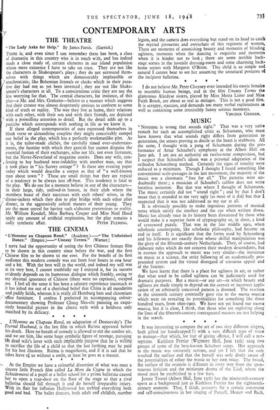CONTEMPORARY ARTS
THE THEATRE.
g, The Lady Asks for Help." By James Parish. (Garrick.) THERE is, and even since I can remember there has been, a class of dramatist in this country who is in touch with, and has indeed made a close study of, certain elements in our island population whose mere existence I have to take on trust. They are not like the characters in Shakespeare's plays ; they do not surround them- selves selves with things which are demonstrably implausible or 4 anachronistic, like Bohemian littorals or clocks which in their puta- tive day had not as yet been invented ; they are not like Shake- speare's characters at all. To a conscientious critic they are not the less worrying for that. The central characters, for instance, of this play—a Mr. and Mrs. Grahame—behave in a manner which suggests that their creator was almost desperately anxious to conform to some kind of truth or reality. The way they live at home, their relations with each other, with their son and with their friends, are depicted with a pointilliste attention to detail. But the detail adds up to a pastiche which corresponds with nothing in life as we know it.
If these alleged contemporaries of ours expressed themselves in blank verse or alexandrine couplets they might conceivably compel our belief in the play, which has a perfectly workmanlike plot. As it is, the tailor-made cliches, the carefully timed over-understate- ments, the facetiae with which they garnish but cannot disguise the essential fustian of their exchanges, echo not life, not even literature, but the Never-Neverland of magazine stories. Does any wife, con- _t fessing to her husband near-infidelity with another man, say that it took place in " his Surrey cottage " ? Is there any evening paper today which would describe a corpse as that of "a well-known man about town " ? These are small things but they are typical of a tendency to be always just off-beat. This tendency is fatal to the play. We do not for a moment believe in any of the characters— in their large, tidy,_ unlived-in houses, in their club where the members boast of their successes with each others' wives, in the dinner-jackets which they don to play bridge with each other after 1 dinner, in the aggressively coltish maners of their young. They are the more unreal for having such elaborate pretensions to reality. Mr. William Kendall, Miss Barbara Couper and Miss Noel Hood apply any amount of artificial respiration, but the play remains a


































 Previous page
Previous page